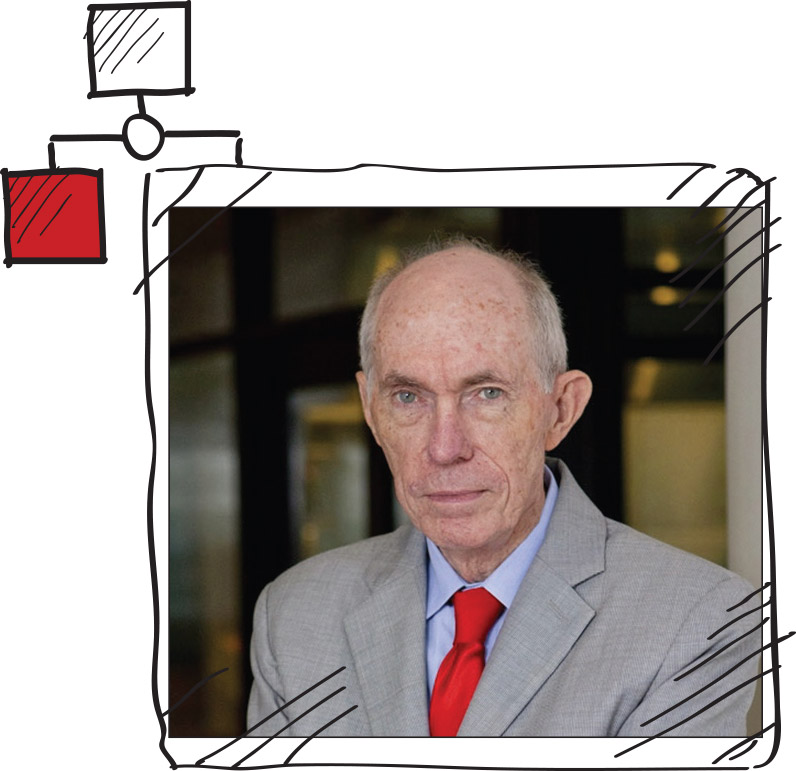Robert Luddy, ’68, certainly didn’t take the conventional route to success—he charted his own. And he wasn’t afraid to take risks along the way.
While many of his La Salle classmates were trying to get their first job, he was selling his first company. When others told him he couldn’t or shouldn’t, he was sinking his own savings into an idea he believed in. And at a time when many would be considering retirement, he’s making a name for himself as an educational innovator.
 “I’m not afraid to go against the grain,” Luddy said. “In fact, I love it.”
“I’m not afraid to go against the grain,” Luddy said. “In fact, I love it.”
His mother was a poet and artist; his father a self-taught electrical engineer. The lessons taught in his household revolved around having a strong character and work ethic, the importance of education, and the traits of successful people.
All of those lessons are still at work in Luddy’s life today, and a spirit of entrepreneurship is at the center of his simultaneous roles as business owner, philanthropist, and educational leader.
During his time at La Salle, Luddy was a finance major by day and a budding entrepreneur by night. He started a fiberglass manufacturing business that he ran successfully in addition to his full-time course load, and then sold the company after graduation.
Today, he is the President and CEO of Raleigh, N.C.-based CaptiveAire, the nation’s leading manufacturer of commercial kitchen ventilation systems. The company, which Luddy started in 1976 with just $1,300 of his own money, now employs 800 people and operates six manufacturing plants in the United States and 90 sales offices in North America.
From its humble beginnings, the business has grown steadily, and, since 2002, its revenues have more than tripled to $300 million last year.
“Legitimate entrepreneurs set very high goals and work like crazy to achieve those goals.” —Robert Luddy, ’68
“When we were a little four-million-dollar company, I set a goal of getting to 25 million dollars with four to five salespeople, and they chuckled at me. But by setting the bar unreasonably high, we had a mark to go after,” Luddy said. “Legitimate entrepreneurs set very high goals and work like crazy to achieve those goals.”
Luddy has maintained a single-minded focus on goal-setting, constant improvement, and ongoing innovation—which makes hiring the right team of people an essential component to the company’s success.
“If you hire skilled people and you give them tough problems, they’re going to solve them,” Luddy said.
That philosophy has carried over into a more recent venture about which Luddy is deeply passionate—establishing a network of charter and private schools.
Seeing a need for schools that emphasized character development along with high academic achievement, he founded a charter school, Franklin Academy, in Wake Forest, N.C., in 1998; a Catholic college preparatory school, St. Thomas More Academy, in Raleigh in 2001; and Thales Academy, a chain of private K–12 college preparatory schools, in 2007.
At all of the schools, there is a dress code and a focus on discipline and good citizenship. Teachers employ the method of Direct Instruction, in which information is presented in small segments so that students can master concepts before moving on to new material, which Luddy said harkens back to the teaching techniques pioneered by St. John Baptist de La Salle, the founder of the Christian Brothers.
The multidisciplinary approach to education at his schools also has its roots in Luddy’s Lasallian education.
“As I look back, what I learned at La Salle was good accounting, philosophy, mathematics—basic core subjects that teach you to be a thinker, to have a depth and breadth of knowledge in order to understand everything we can about a subject,” Luddy said. “Our schools are very dynamic. We teach our students to be constantly learning, growing, and improving; to strive for excellence in everything they do.”
